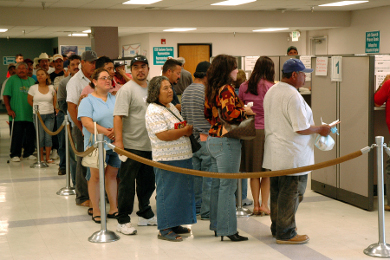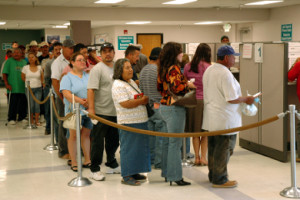Family
Welfare: safety net or trap?

Recently I spoke to a friend who had just returned from a trip to see his family in Greece. I asked about what had been in the news recently – the economy and its collapse. What he told me was not what I expected to hear.
This astute businessman did not attribute the riots in Greece to the economy or the lack of jobs. It was his belief that the economy was fine and jobs were available for those that wanted to work. The problem, according to him, was that the population had become accustomed to government handouts and felt they were entitled to them. He went on to say that when unemployment insurance covered a year, people would be out of work for a year; when unemployment insurance rose and covered 18 months, people would be out of work for 18 months. Then the unemployment insurance rose to two years and people were out of work for two years. Although the unemployment insurance stayed at two years, something very interesting happened: people didn’t want to return to work at all.
The question is whether or not history will repeat itself in the United States. Will our citizens become so dependent on government handouts that they lose the desire to work? If so, the many welfare assistance programs that have been created to help those in need may prove to be more of a trap than a temporary safety net.
Work and welfare: a trade-off?

Hundreds of people who lost jobs when the freeze hit California Jan. 12-14, 2007, lined up at state Unemployment Development Department offices, including the office in the border city of Calexico, to register for the Disaster Unemployment Assistance program funded by FEMA. FEMA Photo by Michael Raphael
Michael Tanner, a senior fellow at the CATO Instituted, a well-respected think tank, recently reported troubling key findings in his article: The Work vs. Welfare Trade-Off: 2013 http://www.cato.org/publications/commentary/welfare-can-make-more-sense-work. The findings are troubling because this data can very well be the canary in the coal mine telling us that the United States will soon be turning into Greece. They include:
- Nationwide, the value of benefits for a typical recipient family ranged from a high of $49,175 in Hawaii to a low of $16,984 in Mississippi.
- IN 35 states, welfare pays more than a minimum-wage job (even after accounting for the EITC)
- In 13 states, an individual leaving welfare for a job paying the same amount as welfare would see a decline in actual income.
Tanner stated:
In Connecticut, a mother with two children participating in seven major welfare programs (Temporary Assistance for Needy Families, Medicaid, food stamps, WIC, housing assistance, utility assistance and free commodities) could receive a package of benefits worth $38,761, the fourth highest in the nation. Only Hawaii, Massachusetts and the District of Columbia provided more generous benefits.
He went on to say that in Connecticut a mother with two children would have to earn $21.33 per hour for her family to be better off than they would on welfare.
Of course the mother in Connecticut would think the welfare system was a Godsend, and in some ways, it could be. However, in other ways it could be the worst thing that ever happened to her or her children.
A personal story
To help explain why, I’ll get personal. When I was in my early twenties, I left my first husband. As a young mother with limited skills, I was happy to have the welfare safety net available. However, I was keenly aware that my daughter’s financial future may very well depend on the decisions I made, so I decided that I needed to come up with a plan to provide a better life for the two of us. That plan included going to a business school and getting the skills I needed to provide for the both of us. I accomplished my plan – with much anxiety. Although I had chosen a good profession, making the transition from welfare to independence was frightening. I understand that such a transition is still frightening today, and I appreciate why so many cling to the security of welfare and do not venture out on their own.
Today welfare is a tender trap
The situation today is actually much worse for several reasons. When I was on welfare, it was a blessing but it was also very restrictive financially. It wasn’t easy to pay all your bills and live comfortably. Today is has expanded to the point of being financially desirable for many, as Mr. Tanner reported in his article. Additionally, the stigma of living on government assistance is no longer embarrassing but considered to be an entitlement. As in Greece, many on the “system” believe it is the government’s responsibility to provide for them. This is significantly different from believing that it is a parent’s responsibility to provide for their families.
These present day conceptions would lead the mother in Connecticut to be content to stay on welfare. Unless she could earn more than $21.33 per hour, her decision would a logical one, but it would also enslave her. The repercussions of her decision would relegate her forever to dependency on government assistance (or charity, as it was called back in the day) without hope of someday achieving more or doing better. The American Dream for such a person simply would not exist. Existing day to day would be comfortable but would not offer any hope for the future. Her dreams would not include owning a home in the future, buying nice furniture, a nicer car or maybe taking her family on a nice vacation. There would be food on her table, her medical bills would be paid, and she would have a cell phone but she would not have a feeling of self-worth or accomplishment. Chances are she would be a single mother, since the welfare system does not allow husbands and/or fathers to live with their families. This in and of itself is stressful. Remember, I’ve been there and I’ve done that, so I know what I’m talking about. Of course, her children would pay a high price for this as well. They would not have the benefit and love of both parents. Mothers and fathers each bring something different to the family. Regardless of what the politically correct would have you believe, children need both parents.
If this system is not reformed, the enslavement of our mother in Connecticut would not be as pleasant as it currently is today. Eventually, the country will not be able to sustain the growing welfare rolls and the “system” will not be there for this mother when it helps to bankrupt the rest of the nation. Then we will all be trapped – trapped by a populace that has lost the desire to work, has not secured the skills to work, and believes the government is responsible to provide for them. What will happen to them when the money runs out? Worse, what will happen to us when the money runs out?
A 200-year-old warning
Over 200 years ago, Professor Alexander Tyler predicted what would happen to us if this continues. He said:
A democracy cannot exist as a permanent form of government. It can only exist until the voters discover that they can vote themselves largesse from the public treasury. From that moment on, the majority always votes for the candidates promising the most benefits from the public treasury, with the result that a democracy always collapses over loose fiscal policy, always followed by a dictatorship.
The welfare system may be destroying the hopes and dreams of the mother in Connecticut, but it is also destroying our country in the process. It has corrupted our political system and it is helping to bankrupt our nation – all this while looking like the greatest thing since God made little green apples. Just remember, little green apples often have worms. In this case the worm may just do us all in.
[subscribe2]
RoseAnn Salanitri is a published author and Acquisition Editor for the New Jersey Family Policy Council. She is a community activist who has founded the Sussex County Tea Party in her home state and launched a recall movement against Senator Robert Menendez. RoseAnn is also the founder of Veritas Christian Academy, as well as co-founder of Creation Science Alive, and a national creation science speaker.
-

 Civilization2 days ago
Civilization2 days agoWhy Europe Shouldn’t Be Upset at Trump’s Venezuelan Actions
-

 Accountability5 days ago
Accountability5 days agoWaste of the Day: Principal Bought Lobster with School Funds
-

 Executive3 days ago
Executive3 days agoHow Relaxed COVID-Era Rules Fueled Minnesota’s Biggest Scam
-

 Constitution4 days ago
Constitution4 days agoTrump, Canada, and the Constitutional Problem Beneath the Bridge
-

 Christianity Today2 days ago
Christianity Today2 days agoSurprising Revival: Gen Z Men & Highly Educated Lead Return to Religion
-

 Civilization3 days ago
Civilization3 days agoThe End of Purple States and Competitive Districts
-

 Executive3 days ago
Executive3 days agoWaste of the Day: Can You Hear Me Now?
-

 Executive4 days ago
Executive4 days agoWaste of the Day: States Spent Welfare in “Crazy Ways”








I for one welcome the obliteration of all welfare, and it’s most toxic and loathesome manifestation – the poor.
Long live our Lords and Masters! Long live the Invisible Hand! Long live Family Carlyle!
End the problem. End the Waste!
Exaggerating, as usual.